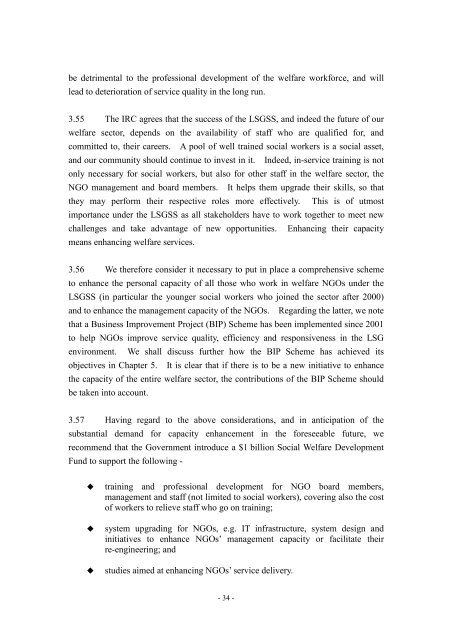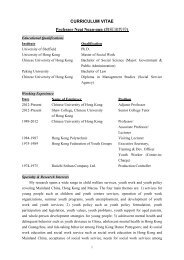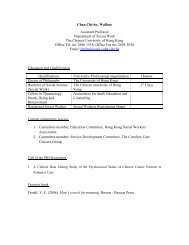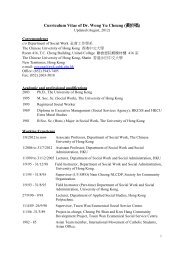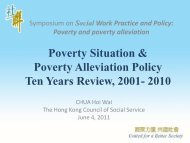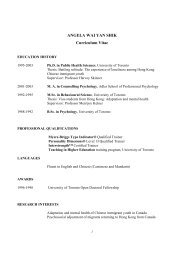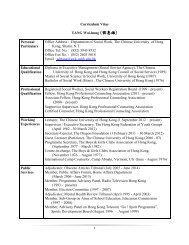Review Report on the Lump Sum Grant Subvention ... - lwb.gov.hk
Review Report on the Lump Sum Grant Subvention ... - lwb.gov.hk
Review Report on the Lump Sum Grant Subvention ... - lwb.gov.hk
You also want an ePaper? Increase the reach of your titles
YUMPU automatically turns print PDFs into web optimized ePapers that Google loves.
e detrimental to <strong>the</strong> professi<strong>on</strong>al development of <strong>the</strong> welfare workforce, and willlead to deteriorati<strong>on</strong> of service quality in <strong>the</strong> l<strong>on</strong>g run.3.55 The IRC agrees that <strong>the</strong> success of <strong>the</strong> LSGSS, and indeed <strong>the</strong> future of ourwelfare sector, depends <strong>on</strong> <strong>the</strong> availability of staff who are qualified for, andcommitted to, <strong>the</strong>ir careers. A pool of well trained social workers is a social asset,and our community should c<strong>on</strong>tinue to invest in it. Indeed, in-service training is not<strong>on</strong>ly necessary for social workers, but also for o<strong>the</strong>r staff in <strong>the</strong> welfare sector, <strong>the</strong>NGO management and board members. It helps <strong>the</strong>m upgrade <strong>the</strong>ir skills, so that<strong>the</strong>y may perform <strong>the</strong>ir respective roles more effectively. This is of utmostimportance under <strong>the</strong> LSGSS as all stakeholders have to work toge<strong>the</strong>r to meet newchallenges and take advantage of new opportunities. Enhancing <strong>the</strong>ir capacitymeans enhancing welfare services.3.56 We <strong>the</strong>refore c<strong>on</strong>sider it necessary to put in place a comprehensive schemeto enhance <strong>the</strong> pers<strong>on</strong>al capacity of all those who work in welfare NGOs under <strong>the</strong>LSGSS (in particular <strong>the</strong> younger social workers who joined <strong>the</strong> sector after 2000)and to enhance <strong>the</strong> management capacity of <strong>the</strong> NGOs. Regarding <strong>the</strong> latter, we notethat a Business Improvement Project (BIP) Scheme has been implemented since 2001to help NGOs improve service quality, efficiency and resp<strong>on</strong>siveness in <strong>the</strong> LSGenvir<strong>on</strong>ment. We shall discuss fur<strong>the</strong>r how <strong>the</strong> BIP Scheme has achieved itsobjectives in Chapter 5. It is clear that if <strong>the</strong>re is to be a new initiative to enhance<strong>the</strong> capacity of <strong>the</strong> entire welfare sector, <strong>the</strong> c<strong>on</strong>tributi<strong>on</strong>s of <strong>the</strong> BIP Scheme shouldbe taken into account.3.57 Having regard to <strong>the</strong> above c<strong>on</strong>siderati<strong>on</strong>s, and in anticipati<strong>on</strong> of <strong>the</strong>substantial demand for capacity enhancement in <strong>the</strong> foreseeable future, werecommend that <strong>the</strong> Government introduce a $1 billi<strong>on</strong> Social Welfare DevelopmentFund to support <strong>the</strong> following -training and professi<strong>on</strong>al development for NGO board members,management and staff (not limited to social workers), covering also <strong>the</strong> costof workers to relieve staff who go <strong>on</strong> training;system upgrading for NGOs, e.g. IT infrastructure, system design andinitiatives to enhance NGOs’ management capacity or facilitate <strong>the</strong>irre-engineering; andstudies aimed at enhancing NGOs’ service delivery.- 34 -


